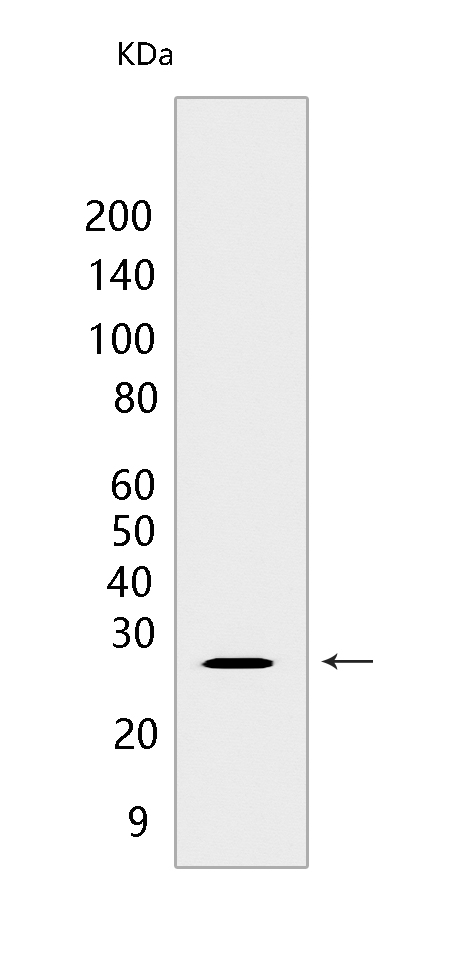ERAB/HSD17B10 Rabbit mAb[8278]Cat NO.: A95073
Western blot(SDS PAGE) analysis of extracts from 293T cells.Using ERAB/HSD17B10 Rabbit mAb IgG [8278] at dilution of 1:1000 incubated at 4℃ over night.
Product information
Protein names :HSD17B10,ERAB,HADH2,MRPP2,SCHAD,SDR5C1,XH98G2,HCD2_HUMAN,3-hydroxyacyl-CoA dehydrogenase type-2 -hydroxysteroid dehydrogenase )) -hydroxysteroid dehydrogenase)
UniProtID :Q99714
MASS(da) :26,923
MW(kDa) :27kDa
Form :Liquid
Purification :Protein A purification
Host :Rabbit
Isotype :IgG
sensitivity :Endogenous
Reactivity :Human,Mouse,Rat
- ApplicationDilution
- 免疫印迹(WB)1:1000-2000
- The optimal dilutions should be determined by the end user
Specificity :Antibody is produced by immunizing animals with a synthetic peptide of human ERAB/HSD17B10.
Storage :Antibody store in 10 mM PBS, 0.5mg/ml BSA, 50% glycerol. Shipped at 4°C. Store at-20°C or -80°C. Products are valid for one natural year of receipt.Avoid repeated freeze / thaw cycles.
WB Positive detected :293T cells
Function : Mitochondrial dehydrogenase involved in pathways of fatty acid, branched-chain amino acid and steroid metabolism (PubMed:9553139, PubMed:10600649, PubMed:12917011, PubMed:20077426, PubMed:18996107, PubMed:19706438, PubMed:25925575, PubMed:26950678, PubMed:28888424). Acts as (S)-3-hydroxyacyl-CoA dehydrogenase in mitochondrial fatty acid beta-oxidation, a major degradation pathway of fatty acids. Catalyzes the third step in the beta-oxidation cycle, namely the reversible conversion of (S)-3-hydroxyacyl-CoA to 3-ketoacyl-CoA. Preferentially accepts straight medium- and short-chain acyl-CoA substrates with highest efficiency for (3S)-hydroxybutanoyl-CoA (PubMed:9553139, PubMed:10600649, PubMed:12917011, PubMed:25925575, PubMed:26950678). Acts as 3-hydroxy-2-methylbutyryl-CoA dehydrogenase in branched-chain amino acid catabolic pathway. Catalyzes the oxidation of 3-hydroxy-2-methylbutanoyl-CoA into 2-methyl-3-oxobutanoyl-CoA, a step in isoleucine degradation pathway (PubMed:20077426, PubMed:18996107, PubMed:19706438). Has hydroxysteroid dehydrogenase activity toward steroid hormones and bile acids. Catalyzes the oxidation of 3alpha-, 17beta-, 20beta- and 21-hydroxysteroids and 7alpha- and 7beta-hydroxy bile acids (PubMed:10600649, PubMed:12917011). Oxidizes allopregnanolone/brexanolone at the 3alpha-hydroxyl group, which is known to be critical for the activation of gamma-aminobutyric acid receptors (GABAARs) chloride channel (PubMed:19706438, PubMed:28888424). Has phospholipase C-like activity toward cardiolipin and its oxidized species. Likely oxidizes the 2'-hydroxyl in the head group of cardiolipin to form a ketone intermediate that undergoes nucleophilic attack by water and fragments into diacylglycerol, dihydroxyacetone and orthophosphate. Has higher affinity for cardiolipin with oxidized fatty acids and may degrade these species during the oxidative stress response to protect cells from apoptosis (PubMed:26338420). By interacting with intracellular amyloid-beta, it may contribute to the neuronal dysfunction associated with Alzheimer disease (AD) (PubMed:9338779). Essential for structural and functional integrity of mitochondria (PubMed:20077426).., In addition to mitochondrial dehydrogenase activity, moonlights as a component of mitochondrial ribonuclease P, a complex that cleaves tRNA molecules in their 5'-ends (PubMed:18984158, PubMed:24549042, PubMed:25925575, PubMed:26950678, PubMed:28888424). Together with TRMT10C/MRPP1, forms a subcomplex of the mitochondrial ribonuclease P, named MRPP1-MRPP2 subcomplex, which displays functions that are independent of the ribonuclease P activity (PubMed:23042678, PubMed:29040705). The MRPP1-MRPP2 subcomplex catalyzes the formation of N(1)-methylguanine and N(1)-methyladenine at position 9 (m1G9 and m1A9, respectively) in tRNAs,HSD17B10/MRPP2 acting as a non-catalytic subunit (PubMed:23042678, PubMed:25925575, PubMed:28888424). The MRPP1-MRPP2 subcomplex also acts as a tRNA maturation platform: following 5'-end cleavage by the mitochondrial ribonuclease P complex, the MRPP1-MRPP2 subcomplex enhances the efficiency of 3'-processing catalyzed by ELAC2, retains the tRNA product after ELAC2 processing and presents the nascent tRNA to the mitochondrial CCA tRNA nucleotidyltransferase TRNT1 enzyme (PubMed:29040705). Associates with mitochondrial DNA complexes at the nucleoids to initiate RNA processing and ribosome assembly..
Tissue specificity :Ubiquitously expressed in normal tissues but is overexpressed in neurons affected in AD..
Subcellular locationi :Mitochondrion. Mitochondrion matrix, mitochondrion nucleoid.
IMPORTANT: For western blots, incubate membrane with diluted primary antibody in 1% w/v BSA, 1X TBST at 4°C overnight.


